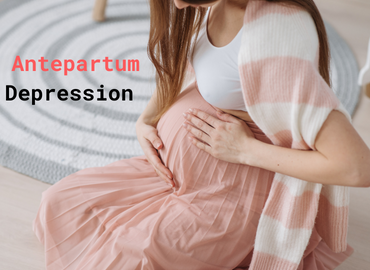Antepartum Depression
Antepartum depression is depression experienced during pregnancy, also called perinatal depression or prenatal depression. Depression while pregnant is not uncommon. About 7% of pregnant people experience antepartum depression according to data reported by Healthline, but the number is likely much higher.
If you have antepartum depression, you may feel:
− Dread about the future
− Fear about mistakes one has not made, like hurting the baby
− Helplessness
− Low self-esteem, such as believing one is not fit to be a parent
− Disinterest in things one usually likes
− A feeling of being mentally blocked from one’s usual functions
− Guilt about not being motivated or able to follow a pregnancy plan perfectly
− Guilt about any health issues the fetus may develop
It is important to note that depression and anxiety don’t care about root causes. One might have every reason to feel anxious about something or in general, or be lost as to why these feelings exist, or somewhere in between. Sufferers often try very hard to feel differently but cannot shake
Some reasons for antepartum depression are:
− Rapidly changing hormones and some hormones at levels previously unknown to the sufferer, high or low
− Any existing mental illness the sufferer had before conception
− Feeling physically ill from the pregnancy
− Stress from all that a new child means for one’s life
− Opposition and/or lack of support from the pregnant person’s family
− Opposition and/or lack of support from the pregnant person’s community
− Opposition and/or lack of support from the pregnant person’s partner, if they have one
Antepartum depression can have negative effects that go beyond mental health. According to studies, untreated antepartum depression can have a hand in:
− Early birth, also called pre-term delivery
− Postpartum depression, or depression that sets in after the birth
− Preeclampsia, or high blood pressure during pregnancy
− The likelihood of having a C-section birth
− Low birth weight
− The likelihood of the child having learning difficulties
− The likelihood of the child having behavioral problems later on
Talk to your doctor openly about your mental health during pregnancy. This is not a time to hide your fears. You’re not hysterical or weak for being distressed. Your general physician is the place to start for getting exams, ruling out contributing factors, ordering tests, locating specialists, making referrals, and accessing resources. There is support in the form of community programs, online services, in-person and online support groups. There are even medications that are safe to take while pregnant.
For questions and appointments, contact us on our website or call (585) 442-6960. If you or a loved one is in crisis, call SAMHSA’s hotline at 1-800-662-4357. You don’t have to be in danger of self-harm to use the hotline. The operators are an excellent source of immediate counsel and can direct you to other resources




